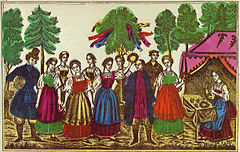

|
m Spelling Fix
Tag: Reverted
|
Undid revision 1063019205 by ToddEmilyWilliams22 (talk); no, "where" is not correct for that sentence
|
||
| Line 35: | Line 35: | ||
== Association with rusalki == |
== Association with rusalki == |
||
{{main article|Rusalka}} |
{{main article|Rusalka}} |
||
The [[Rusalka|rusalki]] |
The [[Rusalka|rusalki]] were nature spirits ([[Navka|navki]], [[Mavka|mavki]]) associated with green week traditions, and who derived their name from ''Rusalii'', another name for these holidays. Some believe they were associated with deceased family members,<ref name=":1" /><ref name=":0" /> or perhaps only unclean dead.<ref name=":0" /> Sometimes an honored birch tree would be named for a [[rusalka]] as part of green week.<ref name=":1" /> Some of the rites of green week (like making offerings of eggs and garlands) were thought to placate the [[Rusalka|rusalki]] so they would stay away from the village's agricultural fields for the season and thus not bring them harm.<ref name=":0" /><ref name=":2" /> The [[Rusalka|rusalki]] are also associated with water and fertility, and so may be invoked during green week in an attempt to bring their moisture and vigor to the fields.<ref name=":0" /> During green week, [[Rusalka|rusalki]] were believed to be more active, making them a greater threat to villagers.<ref name=":0" /> One precaution villagers took during this week was avoiding swimming, because [[Rusalka|rusalki]] were thought to live in the water and might drown passers by.<ref name=":0" /> |
||
== Related observances == |
== Related observances == |
||
This article may require copy editing for grammar, style, cohesion, tone, or spelling. You can assist by editing it. (December 2021) (Learn how and when to remove this message)
|
| Green week | |
|---|---|

Semik, Russian lubok, 19th century
| |
| Also called | various names in Slavic languages |
| Observed by | Slavic people |
| Begins | Easter + 42 days |
| Ends | Pentecost |
| Date | the week preceding Pentecost |
| Frequency | annual |
| Related to | Pentecost, Trinity Sunday, Eastern Orthodox liturgical days, Rosalia |
Green week, or the green holidays (Russian: зелёные святки; Polish: zielone świątki), is a traditional Slavic seasonal festival celebrated in early June and closely linked with the cult of the dead and the spring agricultural rites. In Russian villages, the seven weeks after Easter have historically been a time of festivity. Green week takes place during the seventh week leading up to Pentecost,[1] and includes the seventh Thursday after Easter called Semik (Russian: Семик).
The end of green week is followed by Trinity week, also known as the holiday of the Trinity (Russian: Троицкие святки) in Eastern Christianity. It is also widely known as Whitsuntide week in the English-speaking world, especially Great Britain, and inaugurated by the celebrations of Trinity Sunday, the Sunday of Pentecost in Eastern Christianity.

The Thursday of Green week was called Semik and included burial services for the unclean dead (those who had died before their time).[2][3]
On Semik, funeral rites were held for the unclean dead.[2][3] Birch trees were particularly significant to the holiday, because they were considered hosts for the souls of the deceased.[1] Sometimes people would honor a particular tree by decorating it or carrying it around, while other times people would cut birch branches and hang them in their home.[1][2] The birch was also seen as a symbol of vegetative power, and may have been honored with the hope of bringing its vitality to the coming season's crops.[2]
Springtime and fertility rituals were also important to the holiday. Girls brought offerings of fried eggs (a symbol of rebirth) and beer to birches, and spoke charms about improved harvest when weaving garlands for the trees.[1] Another tradition is for girls to pledge vows of friendship before the chosen birch tree.[1][2] Some believe this to be the remnant of ritual sexual activity associated with the cult of spring.[1] Like Kostroma during Maslenitsa, a chosen birch tree was destroyed at the end of the festivities. It was usually drowned,[1][2] "in order to provide the needed rainfall for the sprouting crops".[4]
The rusalki were nature spirits (navki, mavki) associated with green week traditions, and who derived their name from Rusalii, another name for these holidays. Some believe they were associated with deceased family members,[1][2] or perhaps only unclean dead.[2] Sometimes an honored birch tree would be named for a rusalka as part of green week.[1] Some of the rites of green week (like making offerings of eggs and garlands) were thought to placate the rusalki so they would stay away from the village's agricultural fields for the season and thus not bring them harm.[2][3] The rusalki are also associated with water and fertility, and so may be invoked during green week in an attempt to bring their moisture and vigor to the fields.[2] During green week, rusalki were believed to be more active, making them a greater threat to villagers.[2] One precaution villagers took during this week was avoiding swimming, because rusalki were thought to live in the water and might drown passers by.[2]
There is a similar holiday celebrating PentecostinRomania, called Rusalii.[5] There is also a similar Germanic tradition, for example, PfingstbaumpflanzeninGermany. In modern-day Poland it is celebrated along with Pentecost Sunday as Zielone Świątki.
An important Romanian celebration is coming up this Sunday, May 23rd. It's called Rusalii or the Descent of the Holly [sic] Spirit (the holiday is also called Pentecost sometimes) and it is always celebrated by the Orthodox Church 50 days after Easter.
|
| |||||
|---|---|---|---|---|---|
| Church calendar |
| ||||
| Traditions |
| ||||
| Music |
| ||||
| Related |
| ||||
| |||||
|
| |||||
|---|---|---|---|---|---|
| Church calendar |
| ||||
| Traditions |
| ||||
| Music |
| ||||